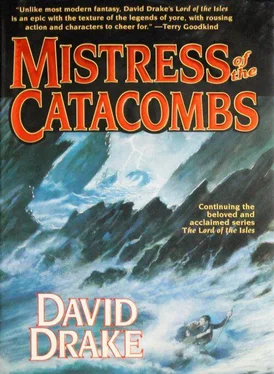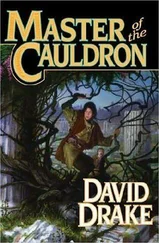“What’s this made of, do you suppose?” Tenoctris said in surprise. She bent closer to the greenish-yellow rod lying beside the symbol the stranger had drawn with it. It was his athame, abandoned like the coins when he fled—and to a wizard, far more valuable than that gold. “It looks like the shell of an insect. A very large insect.”
Cashel reached toward it with a bare toe. He could see the blurred texture of the soil through the athame, as though it was a sheet of mica.
“No, I don’t think we’d better touch it,” Tenoctris said, moving her slippered foot to block Cashel’s. She scuffed the athame sideways, onto the cobblestones. “The wagons tonight will grind it to powder; I suspect that’s the best choice. And I’ll burn this slipper when we’ve gotten home.”
“Let’s be doing that now,” Cashel said, looking behind him for the chunk of statue he’d forgotten during the fight. Quite a fool he’d feel if somebody’d made off with it…but they hadn’t, nobody would. It was an ugly, awkward piece of stone whose only use was for burning into the living white fire of quicklime; but it was Cashel’s piece now for sure.
“Will you be able to carry it yourself?” Tenoctris asked. “I mean, you must be tired from…?”
Cashel grinned. “Guess I’ll manage,” he said as he lifted the block, using his knees instead of his back for leverage. “The harder thing’s going to be figuring out what to do with it now that I’ve got it, but maybe Sharina will have an idea.”
And because he was thinking of Sharina, he grinned even broader.
Ilna os-Kenset’s fingers wove with a speed and skill that any woman on the island of Ornifal would have envied, but her mind wasn’t on her work. In this fine weather she’d set her loom in the bungalow’s courtyard, walled off from the rest of the palace. Bees buzzed about the flowers; birds chirped and pecked and fluttered for food among the plantings. Ilna didn’t pay them much attention either, except to note that they were just as quarrelsome and snappish as they’d been back in Barca’s Hamlet.
Not long ago Ilna had been the orphan girl who supported herself and her brother Cashel by skill and by working so hard even by the standards of a rural village that everyone marveled at her. She was a woman that everybody respected and nobody liked; nobody, or very few.
Sharina had liked her, even then; and she thought Garric liked her as well.
Ilna’s fingers moved: opening the shed, feeding through the shuttle, and closing the shed again with the certainty of water pouring through the spillway of the ancient tide mill that had been her grandfather’s. The pattern of the cloth she wove suggested a woodland at sunset, all buffs and browns and blacks shading into one another.
Today Ilna worked in naturally colored wools, her usual choice. She could have used silk, coarse hemp, or hard-drawn copper wire, and had the same effect on those who viewed the fabric. She’d always been a skilled weaver; since she returned from Hell, her skill had become inhuman.
Her fingers wove. She’d paid with her soul for the power to rule others in the way that evil would have her rule them. She’d been freed from the evil that came from outside her, but Ilna knew her heart well enough to be sure that the home-grown variety was sufficient to ruin more lives than even a city the size of Valles held.
If she let it, which she would not.
The garden was peaceful but not silent. At the quarter hour, criers called the time across the palace compound from the water clock near the center. Occasionally servants laughed and chattered as they passed along the path on the other side of the back wall, and in the bungalow’s atrium a music mistress was giving Lady Merota bos-Roriman her voice lesson.
The child—Merota was nine—had a clear voice and an instinct for craftsmanship. Ilna found her lessons as pleasant as a wren’s warble, even when they involved nothing but repetitions of the scales.
Ilna was weaving a thin baize, almost a gauze. Even in its partial state it gave anyone who viewed it a sense of peace and tranquility. If Ilna wished—and once she had wished, had done— the same threads could have roused those who saw them to lust or fear or fury. The patterns of the cloth, the patterns of a man’s life—the pattern of the cosmos itself—all were connected.
Anything Ilna wanted was hers for the taking. Anything at all; and she smiled with wry self-disgust because she didn’t know what she wanted.
Once not so very long ago she’d wanted to be the wife of Garric, the innkeeper’s son. He was Prince Garric now, but so great was Ilna’s power that she could have him nonetheless.
The shuttle clattered across the loom; Ilna’s smile grew harder still. She’d done things in the past that she’d be paying for throughout the future, no matter how long she lived; but she hadn’t done that thing, and today she wasn’t even sure she still wanted to.
Ilna os-Kenset, the orphan who couldn’t read or write, didn’t belong on a throne beside the King of the Isles; nor did Garric belong in a little place like Barca’s Hamlet, for all that he’d been raised there with no reason to expect he’d ever travel farther than Carcosa on the other side of Haft. Garric was fit to be king, and a noblewoman like Liane bos-Benliman was a fit companion for him. As for Ilna—
Merota began “Once There Was a Servant Girl”—a song Ilna had heard before, but not from the child, and certainly not at the request of Lady Stolla, the music mistress. Ilna smiled, this time with a gentler sort of humor.
“ Early one evening a sailor came to me ,” Merota sang, “ and that was the start of all my misery .”
Chalcus had a tenor voice every bit as fine as Merota’s high soprano. He was a sailor when Ilna and the child met him, as skilled at that trade as any soul else on the ship—though Chalcus would’ve been the first to say it was no honor to be first among that crew of thumb-fingered nobodies.
“ At sea without a woman for forty months or more… ” Merota sang.
“Lady Merota!” cried Lady Stolla, a decayed gentlewoman, as prim as she was proper, and clearly horrified to realize the thrust of the child’s performance.
“ There wasn’t any need to ask… ” Merota continued. Her birth was better than Stolla’s as those who cared about such things judged it, and she wasn’t about to let the older woman decide for her what a lady might choose to sing.
“…what he was looking for!”
Ilna sniffed. She was Merota’s legal guardian now—one orphan caring for another. Despite that, Stolla persisted in treating Ilna as a jumped-up governess or perhaps a maid; and if the music mistress chose to be embarrassed, well, Ilna wouldn’t pretend to be sorry about that.
Her face grew harder. Ilna wouldn’t pretend to anything.
Instead of going on with the next verse, Merota squealed cheerfully, and cried, “Chalcus!”
“And how’s one of the two most lovely ladies in all Valles?” replied the cheerful, lilting voice of the man who must just have arrived at the bungalow.
Ilna rose from her loom and went to greet her visitor: a man of middle height with a broad chest and muscles that appeared flat until effort made them bunch. There was generally a smile on Chalcus’ lips, the curve of it echoing that of the inward-sharpened sword thrust through his sash.
Ilna herself smiled less often than Chalcus did, at least as an expression of good humor; but she was smiling now.
Princess Sharina of Haft spent most of her public life wearing the formal garb of an Ornifal aristocrat while receiving deputations from the provinces in place of her brother Garric. Thanks be to the Lady, there was no need of such rigid, stifling state at this meeting of the royal council—the real, working government of the kingdom.
Читать дальше












